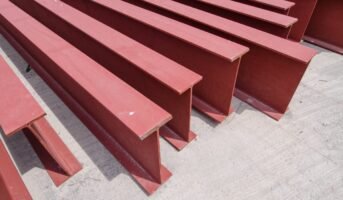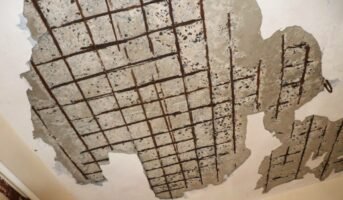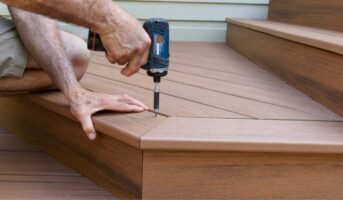Windows are openings in our walls, roofs, or doors that let light and air flow through. Windows make the connection between the inside environment and the outside world. Several materials have emerged on the market and are widely employed by producers. Consumers are increasingly choosing these materials widely because of their many benefits. Because of the advantages they provide, UPVC and aluminum have recently become two of the most often used materials for the production of windows.
The debate over aluminum vs UPVC windows has raged for a long time, and reaching a definitive conclusion isn’t as simple as you might assume. According to your property type, the difference between the two materials may be narrowed considering their many advantages and disadvantages.
It is one of several potentially challenging choices facing homeowners. Although, we want to simplify this process for you by outlining the main benefits and drawbacks of each style of window, allowing you to make an informed choice that’s right for you.
What are UPVC windows?
UPVC window frames offer excellent thermal and acoustic isolation. Frame for such windows is made of a plastic powder known as UPVC (Unplasticized Polyvinyl Chloride). The initial procedure is to heat the UPVC to a specific temperature before molding it into the desired shape. After being poured into a mold, it is cooled in various ways. Then, the material and other parts assembled in the window are cut and prepared.
PVC vs UPVC
| PVC window frames | UPVC window frames |
| Chemicals employed in PVC are those that plasticized vinyl and give it its known flexibility. | Since UPVC doesn’t include any chemicals, it’s a product that is safe for the environment. |
| Because PVC is more porous, it needs more upkeep over time to get surface stains out. | UPVC is a durable polymer with fewer pores which is renowned for its durability and thermal efficiency. |
| In the building windows and doors are rarely utilized. | Utilized particularly in the construction of windows and doors. |
| Cheap but less long-lasting. | UPVC Windows is made of a material that is very durable and inexpensive. |
UPVC windows: Advantages
- Home insulation: Compared to other materials, UPVC windows have better insulation properties and lower energy costs for heating and cooling interior spaces. The Air layer between the double-glass panes gives UPVC windows their insulating benefit.
- Easy maintenance: UPVC Windows is simple to maintain. Because these window frames are durable and last longer, your property will be worth more overall. Due to its affordability, UPVC windows are used in commercial and residential buildings.
- Environmentally friendly: UPVC Windows is free of harmful chemicals. Additionally, these are environmentally preferable alternatives to hardwood window frames, which are challenging to maintain and quickly damaged in severe weather. Because they have a high-quality finish and come in various sizes and patterns, UPVC Windows is a more flexible option than any other material for window frames.
- Superior quality: UPVC windows outperform standard windows in terms of efficiency, noise reduction, weather resistance, etc. UPVC windows keep their toughness, color, and performance for a more extended period with minimal maintenance.
- Window Security: UPVC is a terrific material in terms of security because it is surprisingly resilient. These frames are built in a way that makes them impossible to break into, which frequently serves as a deterrent to potential burglars on its own. Additionally, they can be equipped with specific hinges or locking systems to increase their level of security when there are kids about.
- Versatility and Design: These windows can be found in various hues, finishes, and styles (including casement, bay and bow, tilt, and turn), as well as with multiple furnishings and hinges. You may have nearly limitless ways to customize them, so you can always find the ideal match for your house.
What are aluminum windows?
Aluminum windows can be a feature of your home for many years after installation, making them a popular choice. Due to their elegant, modern style, they frequently appear rather delicate, but they’re anything but and can keep your property secure considerably better than many other materials.
Advantages of aluminum windows
- Thermal Efficiency: Even though aluminum window frames may seem frigid to the touch, aluminum windows are also renowned for having a high level of thermal efficiency.
- Window Lifespan: Aluminum windows have the potential to last longer than other options. They have a long lifespan because they are highly resistant to distortion, flexing, and corrosion.
- Aluminum Window Disposal: Aluminum windows can be entirely recycled when replaced. A more environmentally friendly product results from this. Additionally, it’s possible that you or a future homeowner won’t need to replace these for the first 40 years. If you do, a fully recyclable product will be considerably easier to get rid of.
- Maintenance: Aluminum windows are strong and remarkably simple to keep clean. A short and straightforward clean every few months is all that is required to keep them at their best, removing debris and keeping them bright and glossy.
How much do aluminum and UPVC windows cost in India?
Cost of UPVC Windows
| Based on frame color | Price (per sq. Ft) |
| Light Oak | Rs 350-750 |
| Walnut | Rs 450-550 |
| White | Rs 275-675 |
| Mahogany | Rs 450-880 |
| Based on the opening style | |
| Bay window | Rs 350-550 |
| Casement | Rs 250-700 |
| Combination | Rs 341-460 |
| Fixed window | Rs 200-550 |
| Sliding | Rs 280-700 |
| Tilt and turn | Rs 340-750 |
| Villa window | Rs 350-700 |
Cost of Aluminum Window
| Based on the style of the window | Price (per sq. ft) |
| Sliding | Rs 300-400 |
| Domal sliding window | Rs 300-450 |
| Section partition window | Rs 300-750 |
| Bi-fold Windows | Rs 300-380 |
| Tilt-Turn Windows | Rs 400-850 |
| Casement Windows | Rs 470-850 |
Aluminum window prices: Comparison
Aluminum windows are often compared to other popular window materials such as vinyl, fibreglass, and wood. While Aluminum windows tend to be more expensive than vinyl windows, they are generally less costly than wood and fibreglass windows.
Aluminum windows first gained popularity in the 1970s. However, moisture accumulated inside the frames because the metal was so cold. A preferred material for double glazing in the 1980s was uPVC because of its comfortable feel. Unfortunately, the structures posed a security problem because they were simple to break into. Fortunately, both materials have significantly improved over the years, with all of the previous issues being fixed. There are several factors to consider when considering whether PVC or aluminum windows are superior.
Aluminum Vs UPVC: Aesthetics
The plastic appearance of UPVC Windows isn’t very appealing to homeowners who desire something more distinctive for their property because they are frequently bulky and unpleasant. Its fashionable looks, particularly antique and modern styles, have various colors and finishes. Because aluminum window frames are far thinner than UPVC, they offer the sleek and simple appearance that is so popular in contemporary homes.
Picking aluminum windows over uPVC windows could be brilliant if your home has a more modern aesthetic because it will offer you a sophisticated and stylish edge. However, UPVC windows are ideal for many listed structures or buildings in conservation areas.
Aluminum Vs UPVC: UV Resistance
UPVC Windows is produced from a unique UV-resistant combination, which prevents fading even after prolonged sun exposure. UV resistance is 100%. In contrast, aluminum windows are typically anodized or powder coated. When the powder coating has a low level of UV protection, it will swiftly deteriorate in color.
Aluminum Vs UPVC: Pricing
Installing a window made of aluminum typically costs much more than installing a window made of UPVC because of the material’s expenses of production as well as the cost of labor.
Aluminum Vs UPVC: Expansion and Contraction
Unlike aluminum, UPVC windows don’t expand or shrink as much. As a result, it can maintain stability and not contract, leading to windows that don’t fit well.
While compared to UPVC, aluminum has a very high expansion coefficient, which causes deformation if not made and fitted well.
Aluminum Vs UPVC: Durability
While comparing the longevity of UPVC vs. aluminum windows, both are weather-resistant and long-lasting. However, UPVC has a 30-year lifespan compared to the 50-year lifespan of aluminum.
Aluminum window prices: Factors affecting price
The price of Aluminum windows will depend on several factors, such as the size, style, design, type of window frame, and quality of glass, among other features. In addition, it also varies based on the manufacturer and the location of the supplier. Typically, the larger the window and the more features it has, the higher the price will be.
Further, Aluminum windows usually come with warranties that cover defects and damage. Make sure to learn about the terms and conditions, and the windows’ maintenance requirements to avoid any additional costs later.
Aluminum window prices: Installation costs
The price of Aluminum windows installation may depend on factors such as how complex the installation is, number of windows installed, and location. Make sure to factor in these costs when calculating the total cost of Aluminum windows.
Aluminum window: Energy efficiency
Aluminum windows are energy-efficient when designed with features such as double-pane glass, low-E coatings, and thermal breaks. These features may add to the cost of the window. However, they will lead to long-term energy savings.
Conclusion
It’s safe to conclude that both UPVC and aluminum windows have benefits and drawbacks, making it impossible to say that one is superior to the other. Although It is UPVC Windows and is less expensive, aluminum windows have a longer lifespan. In addition, both materials share several characteristics in common, including low maintenance, simplicity in cleaning, and the potential to save energy costs when double glazing is used.
FAQs
Which type of window is resistant to corrosion?
Due to inherent material qualities, UPVC windows don't rust or corrode. Although aluminum windows don't rust, they are prone to oxidation due to moisture and corrosion, especially if you live near a coastal area. So, if you live near the coast, avoid using aluminum windows.
What distinguishes UPVC windows from PVC ones?
Because of its flexibility, PVC is not used to construct windows.
What drawbacks do UPVC windows have?
Although uPVC windows are very adaptable, not all property types, such as those that demand the narrow sightlines of aluminum, are compatible with those.
What are the disadvantages to aluminum windows?
Aluminum windows easily conduct heat and cold. If not properly insulated, it may result in higher energy bills. Further, these windows can be noisy if not fitted with double-glazed or soundproof glass. Aluminum windows may be prone to condensation if they not properly installed or sealed.
Housing News Desk is the news desk of leading online real estate portal, Housing.com. Housing News Desk focuses on a variety of topics such as real estate laws, taxes, current news, property trends, home loans, rentals, décor, green homes, home improvement, etc. The main objective of the news desk, is to cover the real estate sector from the perspective of providing information that is useful to the end-user.
Facebook: https://www.facebook.com/housing.com/
Twitter: https://twitter.com/Housing
Email: [email protected]












